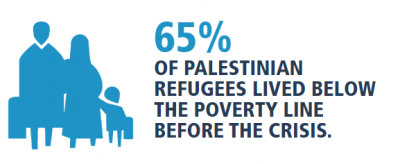Lebanon is experiencing its worst economic crisis in decades. According to the World Bank, it is likely to rank among the top three worst economic crises in the world since the mid-nineteenth century. The value of the local currency has collapsed and inflation has reached an all-time-high. More than half of Lebanon’s six million people are now living below the poverty line.
The economic crisis is happening in the context of the COVID-19 pandemic, where more than half a million cases of the virus have so far been recorded. Hospitals are reporting severe shortages of medicines and equipment; healthcare workers have left the country, leaving a huge gap in human resources; and the government is failing to pay its dues, which has constrained the operational capacity and preparedness of hospitals. 
This multi-layered crisis is disproportionately affecting the most vulnerable people, particularly the 250,000 Palestinian refugees living in camps across Lebanon. Food prices and unemployment rates have soared and many refugees are struggling to secure their basic survival needs. Pregnant women, nursing mothers, and infants are among those at highest risk in these circumstances, as food insecurity and poor nutrition during pregnancy and infanthood can have short- and long-term consequences.
Donate to support Palestinian refugees in Lebanon during this crisis
MAP has been working to support the needs of Palestinian refugees in Lebanon for more than 35 years, responding to immediate health needs while working towards sustainable long-term health development. We are upscaling our emergency response to address the health and healthcare needs arising from the current crisis in Lebanon.
Our team of skilled midwives and nurses provide regular home visits to vulnerable pregnant women, new mothers and babies in the refugee camps. These include health screenings, pregnancy follow-ups, and health and nutritional counselling. In response to growing needs, MAP will be hiring four additional midwives to extend our coverage to more women and babies, including malnutrition screening, referring at-risk cases to free-of-charge national malnutrition services.
With many refugees at high risk of malnutrition, we will be distributing at least 6,000 food parcels for vulnerable families in four Palestinian refugee camps. Each parcel will provide sufficient food for at least two months.
Our COVID-19 emergency response has included providing personal protective equipment and essential medical supplies to frontline health workers at Palestine Red Crescent Society (PRCS) hospitals. MAP will be procuring additional essential equipment for PRCS hospitals.